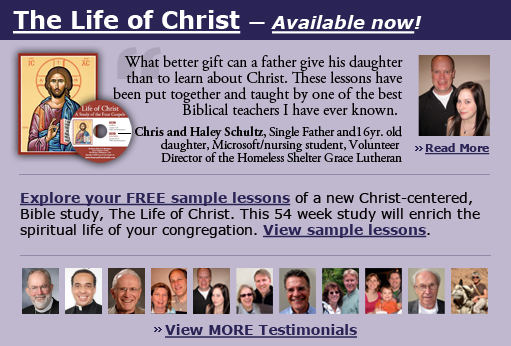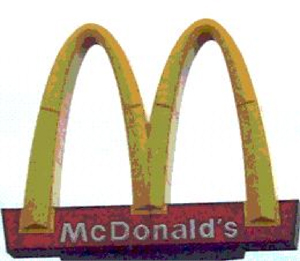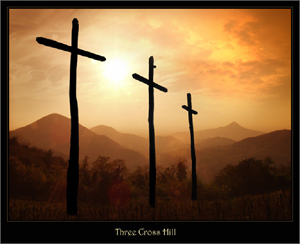
Christmas
Easter
Pentcoest
All Saints
Christ The King
Confirmation
Palm/Passion
Reformation
Stewardship
Books of the Bible
Lenten Series
Christmas Dramas
Videos
Series A - Matthew
Series B - Mark
Series C - Luke
Series D - Other
To contact
Edward F. Markquart
info@sfs.com

Series B Pentecost 7B Mark 6:30-34, 53-56 In today’s sermon, we are going to focus on that one poignant line in the gospel lesson: “For many were coming and going, and they had no leisure even to eat.” The title of the sermon for today is “Hurried, Harried and Hassled, With No Time To Eat.” We all know about fast foods and fast food restaurants. Fast foods are part of our lives.
There are numerous books out about the fast food industry. One particular book that I found on the Internet is entitled, FAST FOOD NATION, The Dark Side of the All American Meal, by Eric Schlosser of the New York Times. This book is great. Eric Schlosser is not only a good researcher of our contemporary American culture of fast food restaurants but he is also a superb writer. Listen to what he says: “OVER THE LAST THREE DECADES, fast food has infiltrated every nook and cranny of American society. An industry that began with a handful of modest hot dog and hamburger stands in southern California has spread to every corner of the nation, selling a broad range of foods wherever paying customers may be found. Fast food is now served at restaurants and drive-throughs, at stadiums, airports, zoos, high schools, elementary schools, and universities, on cruise ships, trains, and airplanes, at K-Marts, Wal-Marts, gas stations, and even at hospital cafeterias. In 1970, Americans spent about $6 billion on fast food; in 2000, they spent more than $110 billion. Americans now spend more money on fast food than on higher education, personal computers, computer software, or new cars. They spend more on fast food than on movies, books, magazines, newspapers, videos, and recorded music - combined. On any given day in the United States about one-quarter of the adult population visits a fast food restaurant. A generation ago, three-quarters of the money used to buy food in the United States was spent to prepare meals at home. Today about half of the money used to buy food is spent at restaurants - mainly at fast food restaurants. The whole experience of buying fast food has become so routine, so thoroughly unexceptional and mundane, that it is now taken for granted, like brushing your teeth or stopping for a red light. It has become a social custom as American as a small, rectangular, hand-held, frozen, and reheated apple pie. The extraordinary growth of the fast food industry has been driven by fundamental changes in American society. Adjusted for inflation, the hourly wage of the average U.S. worker peaked in 1973 and then steadily declined for the next twenty-five years…when the inflation-adjusted value of the minimum wage declined by about 40 percent. In 1975, about one-third of American mothers with young children worked outside the home; today almost two-thirds of such mothers are employed. The entry of so many women into the workforce has greatly increased demand for the types of services that housewives traditionally perform: cooking, cleaning, and child care. The McDonald’s Corporation has become a powerful symbol of America’s service economy, which is now responsible for 90 percent of the country’s new jobs. In 1968, McDonald’s operated about one thousand restaurants. Today it has about twenty-eight thousand restaurants worldwide and opens almost two thousand new ones each year. An estimated one out of every eight workers in the United States has at some point been employed by McDonald’s. The company annually hires about one million people, more than any other American organization, public or private. McDonald’s is the nation’s largest purchaser of beef, pork, and potatoes - and the second largest purchaser of chicken. The McDonald’s Corporation is the largest owner of retail property in the world. Indeed, the company earns the majority of its profits not from selling food but from collecting rent. McDonald’s spends more money on advertising and marketing than any other brand. As a result it has replaced Coca-Cola as the world’s most famous brand. McDonald’s operates more playgrounds than any other private entity in the United States. A survey of American schoolchildren found that 96 percent could identify Ronald McDonald. The only fictional character with a higher degree of recognition was Santa Claus. The impact of McDonald’s on the way we live today is hard to overstate. The Golden Arches are now more widely recognized than the Christian cross.” Yes, that is what the author said. The Golden Arches are now more widely recognized that the Christian cross.”
Knowing that we are all part of this rat-race culture that is hurried, harried and hassled and that the fast food industry is a symbol of our fast paced culture where we get in the “drive through lines” to get our food, let’s take a moment to breath it deeply, take a slow deep breath, relax, calm down, and rest a while during this sermon. Let’s take a moment to rest in the Word of God, in the Bible lesson for today. In the story for today, Jesus had been run out of the synagogue in Nazareth and had sent his disciples out on their first missionary journey. The great prophet of the land, John the Baptist, was beheaded. The disciples returned from their first missionary outing and we anxious to tell Jesus about it. That is the scene for today. Let’s do a Bible study. Would you turn to your bulletin insert and let’s walk through the text. 30 The apostles The apostles of the eyewitness of Jesus, those people who associated with Jesus in the flesh, those people who were the original twelve disciples. The word, “apostle,” means “sent” and the twelve disciples had been sent out on their first missionary journey. Christians are always apostolic people. We are always sent out into the world around us. We are not to sit back in our churches, our homes, our comfortable enclaves but we are sent into the communities, towns and villages around us with the message and power of the gospel. gathered around Jesus, Followers of Christ always gather around Jesus. Jesus is the center, the focus, the core, the axis, the hub of the Christian church. We always gather around Jesus. Jesus is our center. and told him all that they had done and taught. It is almost as if the first disciples were like children, wanting to come back and report to their master what they had done and taught. They wanted to share with Jesus what had happened. We enjoy sharing good news with people who are authority figures in our lives, and who send us out to do a task. These first disciples wanted to share their good news with their mentor and teacher. 31 He said to them, "Come away to a deserted place all by yourselves and rest a while." After Jesus listened to his disciples, he suggested that they go away to a deserted place all by themselves for a while. And rest. By themselves. They had been enormously busy. They had been preaching and healing and sharing the gospel and participating in people’s lives. Now it was time to take a breather, go away and be alone and rest. Underline the words, “Come away to a deserted place, a quiet place all by yourselves and rest a while.” Isn’t that want you and I and our loved ones often need? A quiet place. All by ourselves, to rest? Yes, Jesus teaches us many things about life. Jesus teaches us about the way of love. Jesus teaches us about the power of belief. But Jesus also teaches us some other very basic simple things such as the need for a quiet place, all by ourselves, in order to rest. What is that for you? Where is that for you? Where is your quiet place of rest? Do you go there often? So often, if you are addicted to busyness, activity and productivity like I am, you actually feel guilty about doing this. Sometimes, when you are addicted to busyness, activity, and productivity, you actually don’t know how to be still, quiet and rest. For many were coming and going, We could underline this sentence because these words so accurately describe our lives here in America or wherever we live which has become a rat-race. We know how busy we all are, with all our comings and goings, so much so that we don’t even have time to eat. Underline the phrase, “For many were coming and going.” That is true with your life and mine, for your culture and mine. MANY in our culture of the rat race are coming and going. Here and there and everywhere. We become exhausted by our coming and going. and they had no leisure even to eat. Underline the phrase, “had no leisure even to eat.” Think about similar experiences in your own life and the life of your family and friends when you are too busy even to eat in leisure. Fast food stores have become the norm of America. We find fast food chains on every street corner. Why are fast food stores so popular at this time in the history of America? Because most of us are busy, busy, busy. And think about the “drive through” windows of the fast food restaurants? The cars are lined up. Years ago, there were no “drive through lines” in America and now they are common as can be. We don’t have leisure to eat. We eat in our cars, gulping down our food, while driving to the next point on our “check list” for the day. In this text for today, Jesus our master teacher is not teaching us about the great and grand issues of life such as loving God and neighbor and having a powerful faith that moves mountains. Rather, Jesus is teaching us about the simple things of life such as 32 And they went away in the boat to a deserted place by themselves. We can see the disciples getting into a boat, a large boat that would accommodate them all, and they were going to a deserted place by themselves. That is what many people in America would like to do: to go to a deserted place apart from telephones, cell phones, computers, radios … to go such places with our closest family and friends. Jesus was their shepherd, their leader, their guide and Jesus knew that it was time for his disciples to rest and recuperate, and be alone in the wilderness. In the twenty-third psalm, the shepherd leads his flock to lie down in green pastures and sit beside still waters and thereby restores their souls. Jesus was the good shepherd who was leading his disciples out for rest. Good shepherds are good leaders in our lives. Good shepherds are any leaders and caretakers in our lives who insist that we need times and spaces for pure rest. Jesus, your Good Shepherd and mine, is leading us today, in this moment, to quiet place by ourselves for rest. 33 Now many saw them going and recognized them, and they hurried there on foot from all the towns and arrived ahead of them. But did it happen? The rest? The time apart with the disciples? We meet the crowds again, great crowds. We will meet the crowds again and again in the gospels. The crowds symbolize people who are in a hurry. Circle the word, “hurried,” in the text. The crowds are forever hurried. They symbolize hurry. Rushing, scurrying, dashing, scampering, bustling. That is true of the crowds today. 34 As he went ashore, On the shores of Lake Galilee. It was in about the geographical location of the feeding of the 5000. Near Tabgha. See the maps and pictures below. Tabgha, the traditional location of the feeding of the 5000. It was a remote, lonely area.
Tabgha was a beautiful, remote and lonely place. In the next picture, see how lovely it was. It would have been a great place to kick up one’s feet and rest a while. (leave the following picture on the screen for the remainder of the sermon.)
http://www.rc.net/wcc/israel/lakegal4.jpg he saw a great crowd; Oh, oh. Here comes the crowd. There goes our idyllic dream of alone time, of rest time, of R and R time. Shucks. In the next story, Jesus fed the five thousand.Circle the word, “great,” and write in the words, “5000 plus women and children.” and he had compassion for them, But what was Jesus’ attitude towards the crowd? Compassion. Tenderness. Kindness. Circle the word, “compassion,” and remember that Jesus had the compassionate mind and heart of God within him. That is the way that God feels towards you and me and to crowds to people who do not necessarily believe in him: compassionate. The word, “compassion,” in Greek implies feelings “coming from the bowels,” from deep within us. The Latin is: Com = with. Passio = suffering. With suffering. With passion. With compassion for the others. It is empathy, the feeling for people in their suffering situations and times of life. because they were like sheep without a shepherd; Underline, “sheep without a shepherd.” This also becomes a primary metaphor of Jesus. Jesus is the Good Shepherd and we are the sheep whom Jesus cares for, feeds, waters, protects, and leads on the wise paths of life. and he began to teach them many things. Underline, “he began to each them many things.” Jesus continues to teach us many things today. Jesus wants to still teach us about life, love, eternal life, and eternal love. Jesus wants to teach us about faith and trust in the power and goodness of God. Jesus wants to teach us about the cross and the way of sacrifice and sacrificial love. Jesus wants to teach us about the dangers of following the crowd, the great crowds, who are really lost, harried, hassled and hurried, and don’t know the way of life and love and giving of one’s self to others. But today, in this moment, within this sermon, Jesus wants to teach us about the necessity of rest, being alone in a quiet deserted place and recuperating. 53 When they had crossed over, they came to land at Gennesaret and moored the boat. “Gennesaret” which is another name for Lake Galilee. Notice the detail in Mark’s gospel. We have repeatedly said that Mark’s gospel is a graphic gospel. The Gospel of Mark has the feeling of stories that are being told by an eyewitness (Simon Peter.) We are forever encountering Peter’s vivid and explicit descriptions in this gospel e.g. “they moored the boat.” 54 When they got out of the boat, people at once recognized him, Jesus had become mighty popular after his feeding of the five thousand. Folks knew where to find free food. 55 and rushed about that whole region The crowd rushed to Jesus. Circle the words, “rushed about that whole region.” That is the way it is worth our world: our whole region is rushing around, coming and going. and began to bring the sick on mats to wherever they heard he was. The crowd, knowing that they had been given free food during the feeding of the five thousand, now wanted and expected healings. Jesus, rather than putting the crowd down for following him for the wrong reasons, had compassion on the crowd. He knew they poverty; he knew their illness and he wanted to make them well. 56 And wherever he went, into villages or cities or farms, they laid the sick in the marketplaces, and begged him that they might touch even the fringe of his cloak; and all who touched it were healed. We know that Jesus had become a popular healer of bodily ailments and this was a sign that the Messianic Age had come, that the Messiah who was foretold in the Old Testament had finally arrived. In the previous story about the feeding of the 5000, we discovered that a result of that miraculous feeding was that the crowd wanted Jesus to become a “bread king” for them. In this story, we discover that the crowds wanted Jesus to become a “healing king” for them. People wanted free bread and people wanted free healing. But the crowds did not especially want the kingdom and nor the king. Even so, Jesus had compassion on them. In the gospel story for today, Jesus does not teach us about the great and grand themes of loving God and neighbor. Jesus does not teach us about the great and grand theme of the power of faith. Rather, in today’s story, Jesus our good and wise shepherd, is leading us to rest in green pastures and lie down by still waters and thereby restores our soul. Today, Jesus is teaching us about the wisdom and necessity of finding a quiet place with other loved ones and resting. Amen. |



